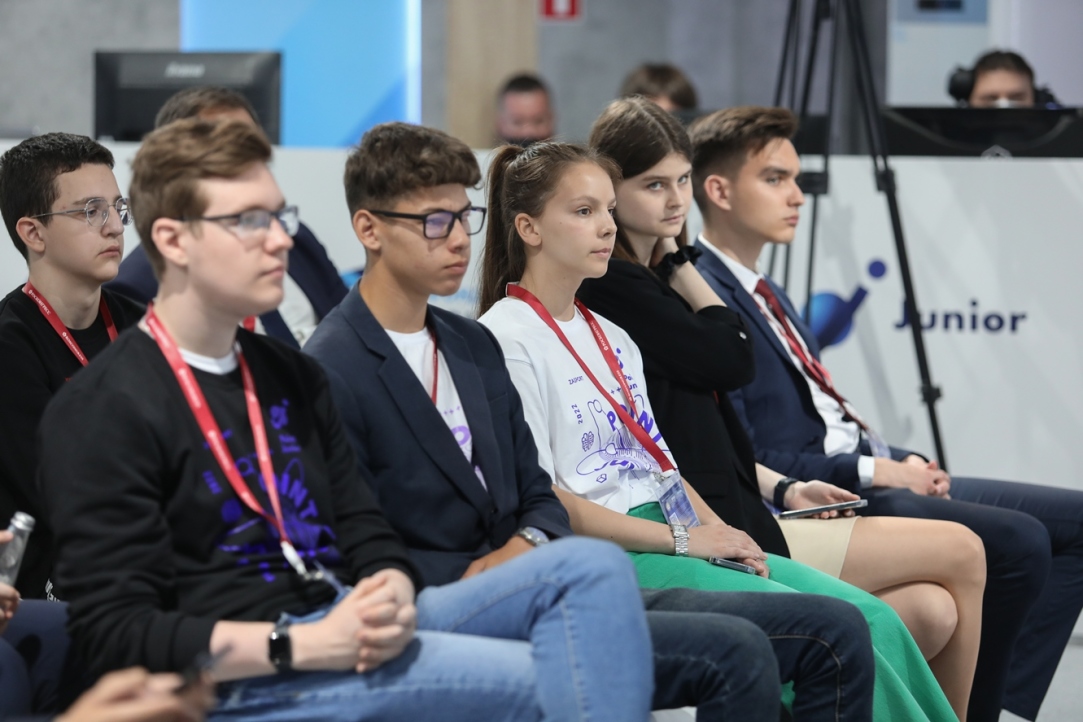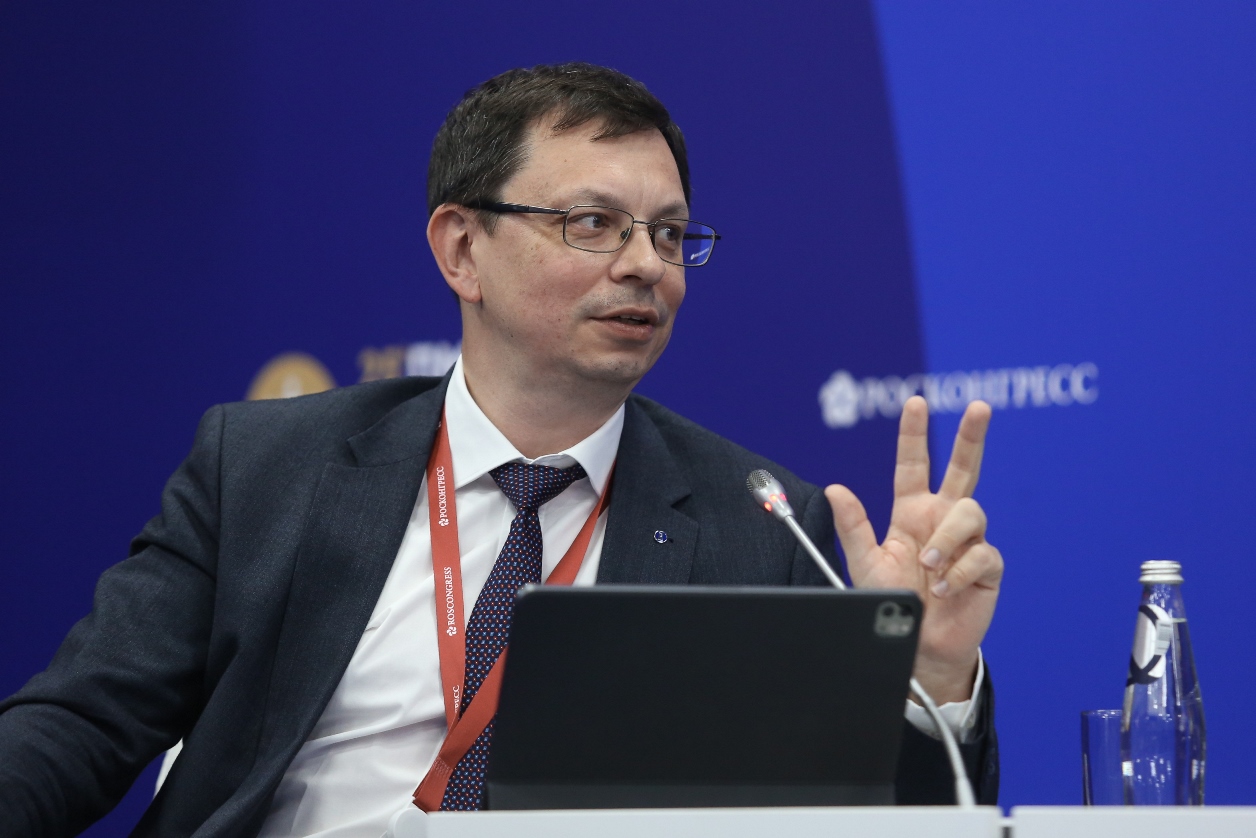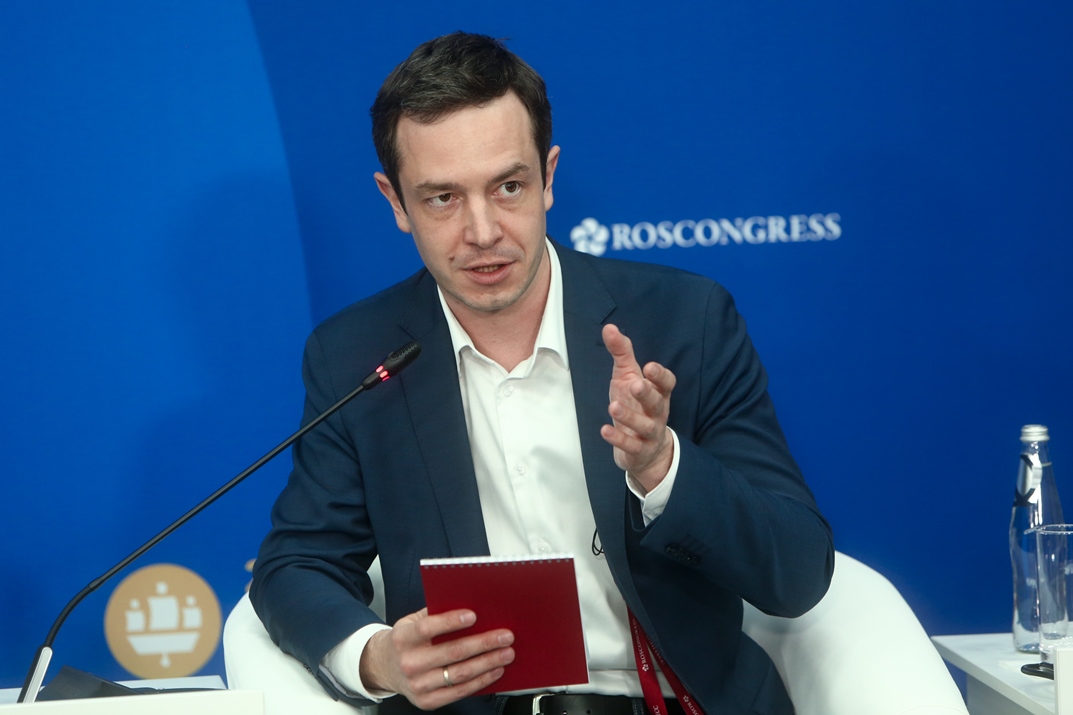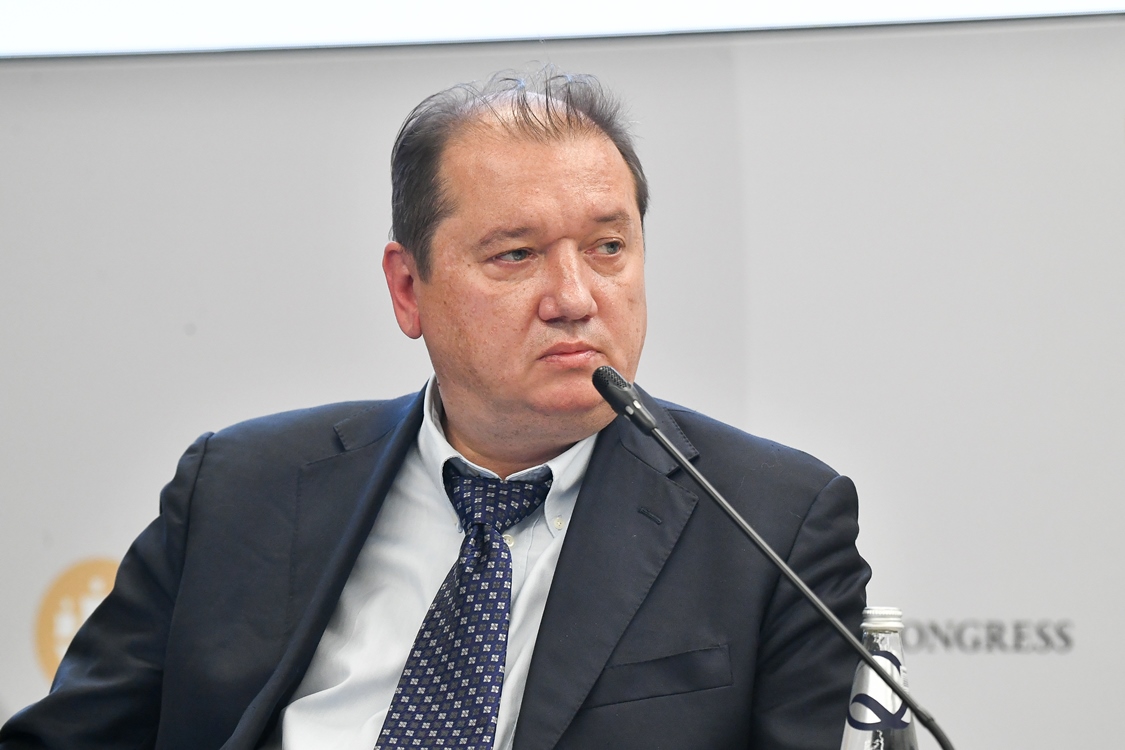‘Today’s Young People Strive to Be Involved in Socially Significant Activities’

Youth as a driver of economic development, the Arctic as a region of constructive cooperation, and innovation as a way to dispel illusions. Experts from HSE University took part in sessions of the 2022 St Petersburg International Economic Forum and HSE Rector Nikita Anisimov answered questions in the interactive studio of the Knowledge Society.
Responding to the question of what education is today, Nikita Anisimov said, ‘In short, it is what’s important for each person individually and for society as a whole’. He explained that Russian education will act as an independent unit in the global educational services market, which does not mean it is rejecting the positive experience gained in recent years. It remains ‘understandable’ to both Russian and foreign students.

The national education system needs digital technologies to be able to make use of all of the best that is available. ‘For me, online and offline formats are complementary because quality is the key thing we should focus on’, the rector said. For example, HSE University has zero tolerance for plagiarism. ‘All our students know that if you copy something, you will no longer be a student at HSE University’, Anisimov emphasised.
With regard to new professions, the rector said that HSE University is admitting students in fields that will be in demand in several years, offering new educational formats and specialisations. As they say at HSE University, students can study everything ‘from Egyptology to neurobiology’, he noted.
The Arctic front
At the session titled International Cooperation as a Guarantee of Sustainable Development of the Arctic, experts discussed the possibilities for interaction in the region given the new conditions. Opening the meeting, Anastasia Likhacheva, Dean of the HSE University Faculty of World Economy and International Affairs, stressed that Russia is aware of the region’s fragility, but that it is necessary to continue the work: ‘Permafrost will not wait. We need to get a feel for the shape of things and of projects to continue cooperation in the Arctic’.
Nikolay Korchunov, Ambassador-at-Large of the Russian Foreign Ministry, noted that now it would be wrong to develop the economy at the expense of nature. ‘For us, the Arctic consists primarily of the population and indigenous peoples. We see it as a territory of constructive cooperation and low tensions. We need a dialogue on all aspects of developing the region and its security’, the diplomat added.
According to retired Vice Admiral Satish Soni, India is interested in preserving the Arctic’s natural landscape because negative changes to it accelerate the melting of snow in the Himalayas, and this affects agriculture. He said that Delhi could form partnerships with countries in the region to work on carbon capture technologies, road construction and shipbuilding.
‘Let’s focus on the most pressing issues and prevent irreversible changes. If we do not gain control over the situation, we could end up on Mars’, he said.
Professor Glenn Diesen of the University of South-Eastern Norway noted that the Arctic remained a region of cooperation even during the Cold War. Now, despite the aggravation of the international situation, it is necessary to look for forms of interaction that benefit all countries. Expanding the circle of participants in the dialogue could stabilise the situation in the region.
The session was also attended by Director of the Arctic and Antarctic Research Institute Alexander Makarov, former Indian Ambassador to Russia Venkatesh Varma Datla Bala, HSE Faculty of World Economy and International Affairs post-doctoral student Kapoor Nivedita, and other experts.
The generation of responsible individuals
Artem Metelev, Chairman of the State Duma Committee on Youth Policy and moderator of the session The Young as a Driver of Socio-Economic Development in an Era of Change, invited the participants to discuss ‘the projects available for young people today and how to involve them in the social agenda and the development of the country so that they are active participants in it and not spectators’.
HSE Vice Rector Dmitry Zemtsov said that HSE University had recently signed an agreement with the Federal Agency for Youth, the Ministry of Education and Science, and the State Duma Committee on Youth Affairs to establish the Youth Policy Project and Training Laboratory at the university.

Young people are truly a driver of economic development, says the HSE University vice rector. Various studies that measured student attitudes found that they have a desire to be involved in socially significant activities. ‘I dare say that this is a feature of the core part of the generation with which we are dealing. The desire to participate meaningfully in the life of their country—this is what distinguishes them’, Dmitry Zemtsov concludes.
He said that in recent months, the young people have taken it upon themselves to help their fellow students, fellow members of the study body who find themselves in a more difficult situation than their own. A student centre was created to solve such problems. ‘They call students day and night, find solutions to individual problems, and speak with the rector. This is the generation that’s willing to personally find solutions to problems they consider important’, the vice rector asserts.
Thirty years of innovation
At the session 30 years of Russia’s Innovation Policy—Creating Companies that are Technological Champions: Lessons and Prospects, a study of the same name was presented that had been prepared by HSE University in cooperation with Innopraktika. Dan Medovnikov, Director of the Institute of Innovation Management at the HSE Graduate School of Business, made the presentation.

Dan Medovnikov said that Russia had gained a variety of experience, including positive experience, from its more than 30 years of developing innovation policy. ‘This consists primarily of people’s experience, the legal framework, and the institutions that have been built. In addition, we have created a nearly complete ecosystem in terms of functionality. It just hasn't been activated yet’.
Andrey Belousov, First Deputy Prime Minister of the Russian Federation, took part in the session. In his opinion, Russia has created a national innovation system and such high-tech industries as pharmaceuticals and the production of composite materials have recently emerged.
Nikita Anisimov
HSE University Rector
Dmitry Zemtsov
Vice Rector
Anastasia Likhacheva
Dean, Faculty of World Economy and International Affairs
Dan Medovnikov
Director, Institute of Innovation Management
See also:
HSE University at SPIEF: Innovations, BRICS, and Healthcare
The St Petersburg International Economic Forum took place on June 18-21, 2025. HSE experts have discussed cooperation between universities, investors, and technology companies in the development of innovations, sharing the best practices in healthcare and drug safety, as well as charity and humanitarian collaboration in the BRICS countries. As a result, several cooperation agreements have been signed during the forum.
‘HSE University Considers Training in AI Technologies to Be a Basic Requirement’
‘Technologies of the Future: A Common Global Space or Every Nation for Itself?’ was the title of a session held on June 19, 2025, with the support of Alfa-Bank at this year’s St Petersburg International Economic Forum (SPIEF-2025). The discussion featured HSE University Rector Nikita Anisimov and was moderated by journalist, TV presenter, and public figure Ksenia Sobchak.
'We Are Open to Cooperation on an Equal Basis and Will Find a Path to a Better Future'
How are digital platforms contributing to sustainable development? How is international cooperation progressing in Eurasia? How should the Russia-India business dialogue proceed? HSE University's scientists presented their answers during expert discussions at the St Petersburg International Economic Forum.
HSE Distinguished Professor Sergey Karaganov Moderates Plenary Session at SPIEF
At the plenary session of the St Petersburg International Economic Forum (SPIEF), Russian President Vladimir Putin participated alongside the Presidents of Bolivia and Zimbabwe, Luis Alberto Arce Catacora and Emmerson Dambudzo Mnangagwa. For the first time, a representative from HSE University—Sergey Karaganov, Academic Supervisor of the Faculty of World Economy and International Affairs and HSE’s distinguished professor—served as the moderator of the plenary session.
HSE University Experts Take Part in Preparing Report ‘Russia—Oman—Partnership Prospects’ at SPIEF 2024
The report, prepared by the Roscongress Foundation and experts of the HSE Institute for Public Administration and Governance, covers the current situation in the economy of the Sultanate of Oman and the prospects for Russian-Omani partnership. Prior to SPIEF 2024, HSE was the first Russian university to sign a cooperation agreement with the University of Nizwa (Oman).
HSE University at SPIEF: From Cyber Gaming to Arctic Development
The timeliness of Russia’s first cyber gaming platform, the importance of closing the gender gap in the IT industry, and the future of international cooperation in the Arctic were just some of the issues discussed at the St Petersburg International Economic Forum (SPIEF). The HSE News Service reports on some of the topics of discussion at the forum.
Qatari Ambassador Ahmed Al Thani Visits HSE University
During the St Petersburg International Economic Forum, HSE University-St Petersburg hosted Sheikh Ahmed bin Nasser bin Jasim Al Thani, Ambassador of Qatar to the Russian Federation.
HSE University at SPIEF: Smart Migration and the Future of the Global Economy
Sessions attended by HSE University experts at the recent St. Petersburg International Economic Forum focused on the digitalisation of migration management, regionalisation of the world economy, participation of companies in global value chains, and many other topics. Below, HSE News Services covers some of the main sessions of the event.
HSE University and Rossotrudnichestvo Agree to Train Specialists in Teaching Russian as a Foreign Language
HSE University and Rossotrudnichestvo have signed an agreement to establish a Russian Language Centre at HSE University in St Petersburg. It will train teachers of Russian studies and future leaders of educational programmes and courses of Russian as a foreign language. The document was signed by HSE University Rector Nikita Anisimov and Head of Rossotrudnichestvo Yevgeny Primakov at the St Petersburg International Economic Forum.
HSE University and Agency for Strategic Initiatives Sign Cooperation Agreement
HSE University and the Agency for Strategic Initiatives (ASI) have agreed to cooperate in the development of new technologies, the digital transformation of the economy, and the social development of the country. The agreement was signed by HSE University Rector Nikita Anisimov and ASI Director General Svetlana Chupsheva at the St Petersburg International Economic Forum.


